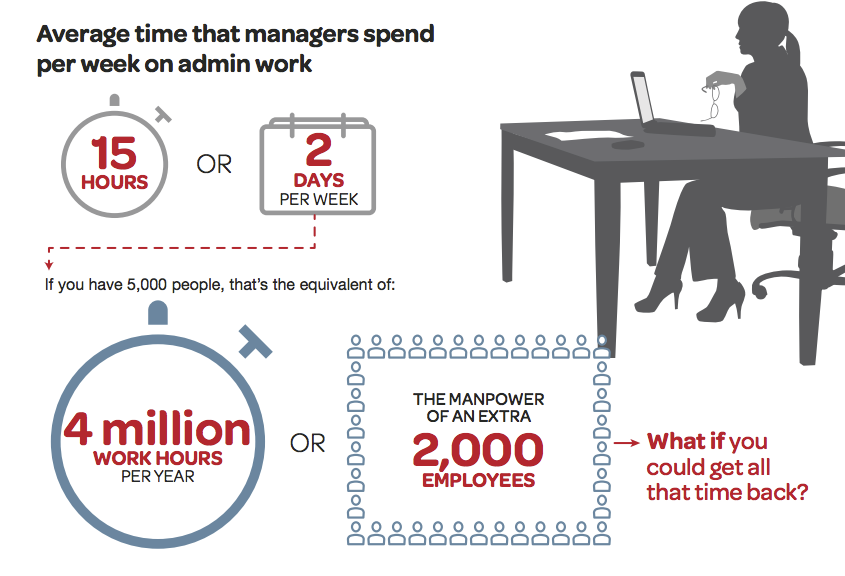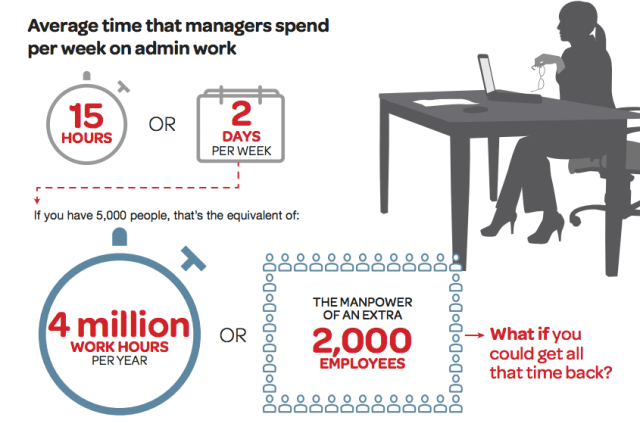Just came across this post on Forbes, which is based on this study.
Here’s the essential takeaway in a visual form:
Yep.
Now, all normal caveats apply here: you can find a study to prove basically anything, right? But I think we’ve long understood that there’s a problem with the effectiveness of management, at least in America — some companies report that 82 percent of their managerial hires end up being the wrong one — but we don’t know exactly what to do about it.
We’ll get to that in a second. First, consider this quote from the Forbes rundown of this study:
On average, managers spent “more than 15 hours or two days a week on routine administrative tasks, with 20% spending three days or more.” These tasks typically included functions like “providing status updates, filling out forms, requesting support and updating spreadsheets.”
Makes sense. A lot of managers I’ve had are like that.
Let’s break down some of the core problems here, if we can:
- At base level, work is essentially a series of deliverables. That’s where everyone focuses their time and energy.
- The problem is … when deliverables change (i.e. when you become a manager), people’s brains are still a bit rigid. They understand their old role — what they were doing before — and it takes about 144 exposures (this is science, baby!) to make them fully comprehend their new job and role.
- Work is also a complex web of relationships, and whenever you have a complex web of relationships, the No. 1 thing your brain fears is looking like an idiot. Because you fear incompetence, then, you probably are more inclined to spend more time on the rote tasks — the ones described above — then actually dive into the more complex stuff. The complex stuff is scary, so why would you devote time there? (A: you wouldn’t.)
- When you see stats like this, it kinda makes more sense that most people don’t know what’s expected of them at work. After all, if your boss doesn’t really know what he/she should be doing to maximize value as relates to time, um, how would you?
There are basically two ways you can fix this “managers don’t understand time, priorities, and value” cluster-mess:
1. Promote Differently: Essentially, create two tracks, right? You can make the same money on either track. You can either manage people or remain an individual contributor. It’s detailed a bit more here. The fact is … a lot of people, especially in a work setting, are self-first, calculating people. Those types of people shouldn’t be managers — and quite frankly, they don’t want to be, but they accept those roles because it’s the only way (in most companies) to make more money. So, design two tracks. The self-focused D-Bags to the left, the empathetic people who might understand how to work with humans to the right. You can make six figures on either track.
2. Train Differently: Management … hmmm. Everything we’ve thought about it since WW2 is, essentially, wrong. We should set it up as more akin to coaching, and less akin to task-mastering. That would probably make the rank-and-files under the managers care a little bit more about their jobs.
The problem here, of course, is that no one really cares about “the effectiveness of management.” They care about, uh, well … margins and revenue. Everything else is a joke, or lip service. So long as managers hit deliverables and play the personal (and personnel) politics right, they’re fine. It’s really that simple for most people.
But you can change it and make the value higher. You need to start by caring, though.

